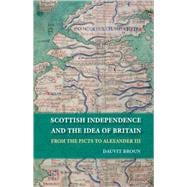
Scottish Independence and the Idea of Britain From the Picts to Alexander III
by Broun, Dauvit-

This Item Qualifies for Free Shipping!*
*Excludes marketplace orders.
Rent Textbook
New Textbook
We're Sorry
Sold Out
Used Textbook
We're Sorry
Sold Out
eTextbook
We're Sorry
Not Available
How Marketplace Works:
- This item is offered by an independent seller and not shipped from our warehouse
- Item details like edition and cover design may differ from our description; see seller's comments before ordering.
- Sellers much confirm and ship within two business days; otherwise, the order will be cancelled and refunded.
- Marketplace purchases cannot be returned to eCampus.com. Contact the seller directly for inquiries; if no response within two days, contact customer service.
- Additional shipping costs apply to Marketplace purchases. Review shipping costs at checkout.
Summary
Author Biography
Table of Contents
| Preface and Acknowledgements | p. vii |
| List of Abbreviations | p. x |
| Map | p. xiii |
| Genealogical Table | p. xiv |
| Introduction | p. 1 |
| The Idea of Britain | |
| Ancient Kingdoms and Island Histories | p. 37 |
| Alba as 'Britain' after 900 and the Pictish Antecedents of the Kingdom of the Scots | p. 71 |
| Independence | |
| The Church and the Beginning of Scottish Independence | p. 101 |
| Whose Independence? Bishop Jocelin of Glasgow (1175-99) and the Achievement of Ecclesiastical Freedom | p. 124 |
| Sovereign Kingship | |
| The Inauguration of Alexander III (1249) and the Portrayal of Scotland as a Sovereign Kingdom | p. 161 |
| From Client King to Sovereign | p. 189 |
| National History | |
| The Principal Source used by John of Fordun for his Chronicle of the Scottish People | p. 215 |
| The Scots as Ancient and Free: 'Proto-Fordun', 'Veremundus' and the Creation of Scottish History | p. 235 |
| Conclusion: from British Identity to Scottish Nation | p. 271 |
| Bibliography of Works Cited | p. 285 |
| Index | p. 307 |
| Table of Contents provided by Ingram. All Rights Reserved. |
An electronic version of this book is available through VitalSource.
This book is viewable on PC, Mac, iPhone, iPad, iPod Touch, and most smartphones.
By purchasing, you will be able to view this book online, as well as download it, for the chosen number of days.
Digital License
You are licensing a digital product for a set duration. Durations are set forth in the product description, with "Lifetime" typically meaning five (5) years of online access and permanent download to a supported device. All licenses are non-transferable.
More details can be found here.
A downloadable version of this book is available through the eCampus Reader or compatible Adobe readers.
Applications are available on iOS, Android, PC, Mac, and Windows Mobile platforms.
Please view the compatibility matrix prior to purchase.
